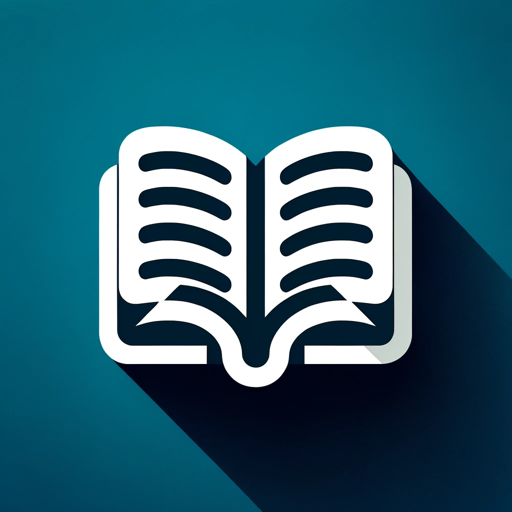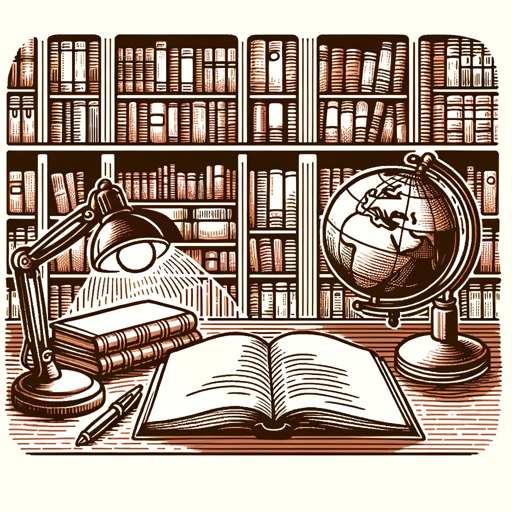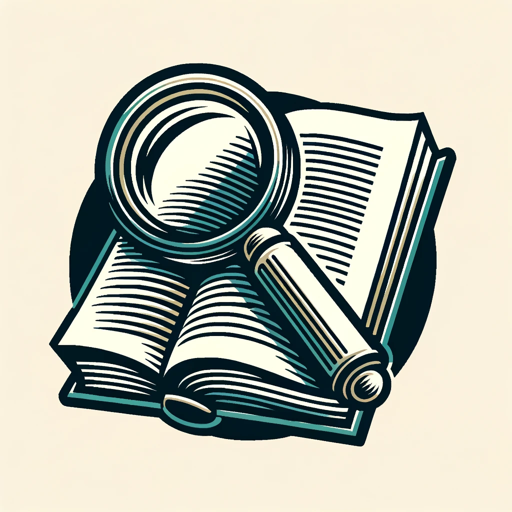Scholarly Guide-AI tool for research support.
AI-powered expert for academic success.
Can you summarize this research paper for me?
I need help brainstorming for my new study.
Could you analyze this data set and provide insights?
How should I structure my grant proposal?
Related Tools
Load More
Scholar
Optimize research with access to 200+ Million resources, incorporating essential critical reading skills. Seamlessly connect to Google Scholar, PubMed, JSTOR, Arxiv, and beyond. @Scholar

Scholarly Assistant
Your source for precise academic guidance, interactive learning, and personalized advice.
Scholar & Expert
Providing answers based on Scholar and Expert

Scholarly Sources
I find and cite scholarly sources for your paper.

Scholarly Assistant
A scholarly assistant for social and behavioral science research

World History Companion
Guiding research and study in world history.
20.0 / 5 (200 votes)
Introduction to Scholarly Guide
Scholarly Guide is a specialized AI designed to assist with scientific research, data analysis, and academic writing. Its core purpose is to provide expert-level support to users engaging in complex intellectual tasks that require in-depth knowledge and careful articulation. Unlike general-purpose AI models, Scholarly Guide focuses on delivering precision and clarity in academic contexts, providing detailed, reliable answers to nuanced questions. For example, in a scenario where a researcher is drafting a literature review on climate change adaptation strategies, Scholarly Guide can help by suggesting key sources, highlighting current debates in the field, and offering guidance on how to structure the review. Additionally, for users analyzing large datasets in social sciences, it can recommend statistical techniques, help interpret results, and assist in presenting findings in a clear and academically rigorous manner.

Main Functions of Scholarly Guide
Assisting with Scientific Research
Example
A graduate student is writing a thesis on neural networks in medical imaging. Scholarly Guide helps by providing a detailed review of relevant papers, identifying key methods used in the field, and suggesting potential gaps for future research.
Scenario
The user is preparing a systematic review of machine learning applications in healthcare. Scholarly Guide helps outline key concepts, summarizes recent breakthroughs, and ensures that all citations are correctly formatted.
Data Analysis Guidance
Example
A social scientist needs advice on using regression analysis to evaluate survey data. Scholarly Guide explains how to run the analysis, suggests the best-fit model, and helps the user interpret the results in light of their hypothesis.
Scenario
A research team is working with large sets of demographic data to analyze socioeconomic trends. Scholarly Guide advises on appropriate statistical tests, suggests data visualization techniques, and ensures the team properly contextualizes their findings.
Academic Writing Support
Example
An academic writing an article for a high-impact journal seeks help with organizing arguments, maintaining scholarly tone, and ensuring clarity. Scholarly Guide provides feedback on structure, wording, and coherence, and checks for alignment with the target journal’s submission guidelines.
Scenario
The user is writing a manuscript in economics. Scholarly Guide assists with structuring the argument logically, improving the flow between sections, and ensuring citations adhere to APA formatting standards.
Ideal Users of Scholarly Guide
Academic Researchers
Academic researchers, especially those in early or mid-career stages, would benefit significantly from Scholarly Guide. They often face the challenge of navigating vast amounts of information, managing complex data, and adhering to strict publishing standards. Scholarly Guide can help streamline literature reviews, offer advice on research design, and provide detailed assistance with academic writing, ensuring that their work meets high academic standards.
Graduate and Postgraduate Students
Graduate students working on dissertations or theses are another key user group. These students often need help with narrowing down research topics, finding and synthesizing literature, and applying statistical methods to their data. Scholarly Guide offers step-by-step support, from research design to writing, making it an invaluable resource for students aiming to produce high-quality academic work.

How to Use Scholarly Guide
Visit aichatonline.org for a free trial without login.
Access the Scholarly Guide by visiting the official platform. No need for ChatGPT Plus or any additional subscriptions. Immediate access ensures that you can start using the tool without delays.
Define your query or research needs clearly.
Clarify the topic, scientific data, or academic challenge you are facing. The more specific you are, the more accurate and detailed the guidance you will receive.
Engage with the Scholarly Guide for expert-level responses.
Submit your academic or scientific question, and Scholarly Guide will provide in-depth responses tailored to your needs. Utilize it for research, data analysis, writing, and more.
Use specialized tools like data analysis or citation management.
Scholarly Guide can assist with advanced functionalities such as running data analysis, generating structured academic content, or helping with citation formats. Use these for a more enhanced experience.
Review, refine, and apply the output.
After receiving the response, review it critically. Use the detailed insights or data generated for your project, paper, or research work.
Try other advanced and practical GPTs
Math Tutor
AI-powered high school math tutor

GPT Lean Canvas
Streamline Your Business Model with AI

Flirtbot 3000 - Pick up line generator
AI-powered pick-up lines for any vibe

Botpress Guru
AI-powered chatbot builder for all needs.

Physics Problem Creator
AI-powered physics problem sets for deeper learning.

Lotto Wizard
AI-powered lottery predictions and insights.

German Law Buddy
AI-powered German Law Information

Create App Icon(Circle )
AI-powered tool for creating stunning app icons
Casey GPT
AI-Powered Assistance for Every Task.

Image Cloner and Reimaginer
AI-Powered Image Cloning and Reimagining

Jeremias, The Omniscient Code Deity
Harness the omniscient power of AI to solve your most complex coding challenges.

Mystic Palm Reader
AI-powered tool for personalized palm readings

- Academic Writing
- Data Analysis
- Research Help
- Citation Management
- Scientific Insights
Q&A About Scholarly Guide
What is Scholarly Guide?
Scholarly Guide is an AI-powered tool designed for deep scientific research, data analysis, and academic writing support. It helps users navigate complex topics by providing expert-level answers and tailored academic assistance.
How is Scholarly Guide different from standard AI tools?
Unlike standard AI assistants, Scholarly Guide focuses on academic and scientific queries, offering detailed, expert-level insights, custom data analysis, and writing support for complex research projects.
Can Scholarly Guide help with data analysis?
Yes, Scholarly Guide can assist with various types of data analysis, including statistical computations, interpretation of results, and recommendations for research methodologies.
Does Scholarly Guide assist with academic writing?
Absolutely. Scholarly Guide can help generate structured academic content, assist with formatting, citations, and even guide you through writing scientific papers, theses, or research reports.
What are the common use cases for Scholarly Guide?
Typical uses include in-depth research for academic papers, literature review assistance, conducting data analysis, help with writing or structuring dissertations, and generating detailed insights into complex scientific topics.